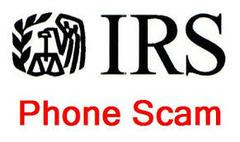 The IRS warns taxpayers of several scams that are making the rounds as 2016 draws to a close. Perpetrators of fraud use the telephone, email and traditional mail to try to scam unsuspecting people out of their money or personal information.
The IRS warns taxpayers of several scams that are making the rounds as 2016 draws to a close. Perpetrators of fraud use the telephone, email and traditional mail to try to scam unsuspecting people out of their money or personal information.
Some of the most prevalent IRS impersonation scams include requests for fake tax payments. Victims receive an automated call stating they need to call back to settle their “tax bill.” Such calls typically claim to the be the last warning before legal action is taken. Some taxpayers also get similar calls from a live person, who may demand payments on prepaid debit cards, iTunes or other gift cards or via wire transfer. IRS officials say those are red flags of scam activity.
Another scam targets students and parents and demands payment for a fake “Federal Student Tax.” IRS officials say scammers threaten to report the student to the police if payment is not made. They stress there is no such tax, and the best thing to do is hang up.
Other taxpayers around the country have reported receiving fraudulent tax bills for 2015 related to the Affordable Care Act. It includes a payment request that taxpayers mail a check made out to “I.R.S.” to the “Austin Processing Center” at a Post Office Box address.
Additionally, IRS officials say payroll and human resources professionals should be aware of phishing email schemes that pretend to be from company executives and request personal information on employees. The email contains the actual name of the company chief executive officer. In this scam, the “CEO” sends an email to a company payroll office employee and requests a list of employees and financial and personal information including Social Security numbers.
Even tax professionals are the targets of scams. They may get emails pretending to be from tax software companies asking them to download and install an important software update via a link included in the email update. The program actually tracks key strokes, which is a common tactic used by cyber thieves to steal login information, passwords and other sensitive data.
Attempts to verify tax return information over the phone are also scams designed to get an unsuspecting person’s Social Security number or personal financial information like bank account and credit card numbers.
Also beware of emails claiming to be from the IRS or others in the tax industry, including tax software companies. They ask for information related to refunds and filing status and seek to “confirm” personal information and verify PIN information.
IRS officials stress they will never call and demand immediate payment via prepaid or gift card or wire transfer, nor will they send emails or text messages. Generally they will mail a bill if you owe taxes. Also they will not threaten to immediately bring in local police or law enforcement groups to arrest people for non-payment or demand that you pay taxes without giving you a chance to question or appeal the amount you owe. Additionally the IRS will not ask for credit or debit card numbers over the telephone.
Anyone who gets a suspicious telephone call from someone claiming to be from the IRS and asking for money should hang up immediately. Also, search the internet for telephone numbers scammers leave in your voicemail asking for a return call. They may be linked to criminal activity.
Calls should also be reported to federal authorities. Contact TIGTA to report the call. Use their “IRS Impersonation Scam Reporting” web page or call 800-366-4484. Report it to the Federal Trade Commission. Use the “FTC Complaint Assistant” on FTC.gov. Please add “IRS Telephone Scam” in the notes.
If you receive an unsolicited email that appears to be from either the IRS or an organization closely linked to the IRS, such as the Electronic Federal Tax Payment System (EFTPS), report it by sending it to phishing@irs.gov.
Also, if you think you may owe taxes, contact the IRS directly at 800-829-1040.






















